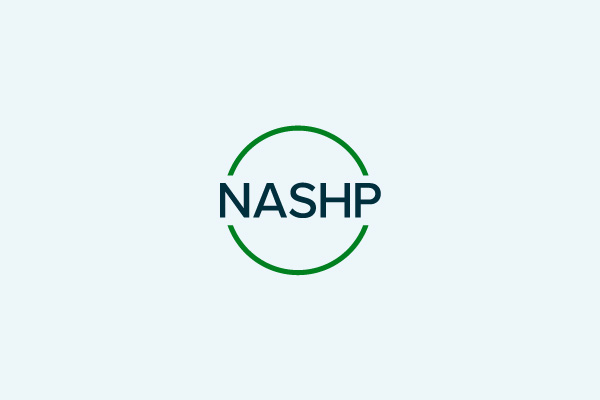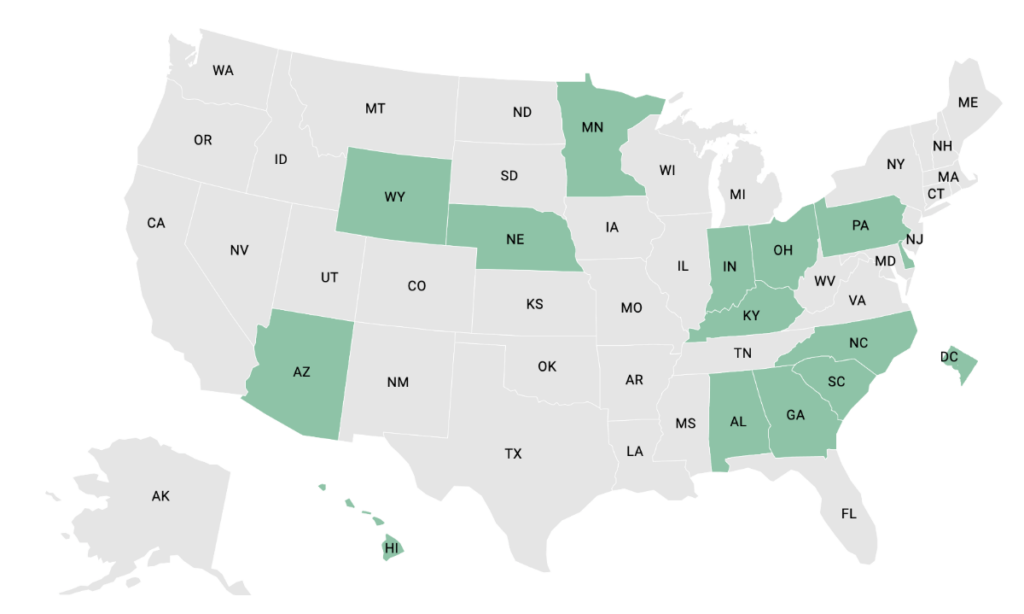This information was collected through a combination of state surveys and NASHP staff research. It offers a snapshot of how the state is defining, training, certifying, and paying for the CHW workforce — as well as how the state is developing cross-agency and state-to-local strategies to improve community health in partnership with CHWs.
This is a dynamic policy space, and states are continuing to develop new approaches. We will continue to make periodic updates to this page. Learn more about state CHW policies across the U.S.
State CHW Definition
The Massachusetts Department of Public Health (DPH) uses the following definition of a CHW: “public health workers who apply their unique understanding of the experience, language and culture of the populations they serve in order to carry out one or more of the following roles:
- Providing culturally appropriate health education, information and outreach in community-based settings, such as homes, schools, clinics, shelters, local businesses and community centers
- Bridging and/or culturally mediating between individuals, communities and health and human services, including actively building individual and community capacity
- Assisting people to access the services they need
- Providing direct services, such as informal counseling, social support, care coordination and health screenings
- Advocating for individual and community needs
CHWs are distinguished from other health professionals because they are hired primarily for their understanding of the populations and communities they serve; spend a significant portion of time conducting outreach in the categories above; and have experience providing services in community settings.”
Certification and Training
The Board of Certification of CHWs is located within the Massachusetts Department of Public Health (DPH) in the Bureau of Health Professions Licensure. The board has the authority to grant voluntary certification to individual CHWs and to approve CHW core competency training programs. Certification regulations also require approved training programs to include a CHW co-trainer or trainer in at least 40 percent of instructional hours, which provides an advancement opportunity for CHWs.
DPH and the Office of CHWs encourage CHW training programs to offer CHW supervisor training and CHW employers to support the CHW supervisors to attend the training. In 2001, DPH implemented contract policy for community-based vendors, requiring them to provide a certain amount and type of regular supervision (both clinical and programmatic) to CHW employees. MassHealth has developed and delivered a publicly available CHW supervisor training as part of the state’s Delivery System Reform Incentive Payment Statewide Investments portfolio.
Medicaid Reimbursement
Although MassHealth does not directly reimburse CHWs for services, CHWs participate in the delivery of Medicaid services through community health centers (CHCs), group practices, and other provider types. In 2023, MassHealth launched a capitated primary care program through its accountable care organizations, which incentivizes team-based care, including supports provided by CHWs.
Other Funding or Financing Mechanisms
Massachusetts Department of Public Health (DPH) received funding through the CDC Community Health Workers for COVID Response and Resilient Communities (CCR) initiative and is working with 10 primary care sites in nine cities in which CHWs are working to re-engage patients in primary care, coordinate care, and address patients’ COVID-19 and health-related social needs.
Massachusetts has dedicated funding from multiple sources to support state CHW infrastructure. The Office of CHWs is supported by CDC chronic disease funding, and the Massachusetts Board of Certification of CHWs is supported by general DPH operating funds.
Key Partnerships
Commonwealth Corporation is a key partner on a variety of CHW workforce development initiatives, and the Massachusetts Association of CHWs and with the Massachusetts Public Health Association are critical partners also. State agencies have fostered strong relationships with CHW training programs.
State CHW Legislation
Multiple pieces of legislation have influenced the landscape of CHW policy in Massachusetts, including the 2006 health reform law and a 2010 law that established a CHW certification board. Additionally, the state developed regulations for certification and contract language for DPH-funded community-based vendors that employ CHWs.
State Resources
State Overviews
ACO – Accountable care organization
AHEC – Area Health Education Centers
APHA – American Public Health Association
APM – Alternative payment model
CBO – Community-based organization
CDC – Centers for Disease Control and Prevention
CDC CCR Funding – Community Health Workers for COVID Response and Resilient Communities Funding
CHR – Community health representative
CHW – Community health worker
CPT Codes – Current Procedural Terminology Codes
C3 Project – CHW Core Competency Project
FFS – Fee for services
HCSPCS Codes – Healthcare Common Procedure Coding System Codes
HRSA – Health Resources & Services Administration
MCO – Managed care organization
NACHW – National Association of Community Health Workers
SDOH – Social determinants of health
VBP – Value-based payment
State CHW Definition: This category indicates where states have a formal definition of a CHW. In some cases, where there is not a definition in statute, this category may draw information from provider manuals and state websites or reports.
Certification and Training: This category includes information about how CHWs are trained in the state, which entities provide training, whether or not the state runs or recognizes a CHW certification program, and information about the entities that administer existing certification programs.
Medicaid Reimbursement: This category includes information about state Medicaid strategies that provide enrollees access to CHW services. Entries indicate whether state Medicaid programs currently reimburse for CHW services or incorporate CHWs into alternative payment models under the authority of a state plan amendment (SPA), or where states have earmarked funds to support CHW services under the authority of an 1115 demonstration waiver. It also indicates where CHW services might be supported through managed care approaches (e.g., where MCOs are paying for CHW services using administrative dollars or where states are using managed care contracts to incentivize or require MCOs to cover CHW services).
Other Funding or Financing Mechanisms: This category includes information about other state funding or financing approaches that cover CHW services or CHW positions. It includes information about federal grant dollars for which the state is the grantee.
Key Partnerships: This category offers information about key partners outside state government, including state CHW associations and CHW training entities, and highlights formal cross-agency partnerships within the state that support alignment of funding and resources for the CHW workforce.
State CHW Legislation: This category highlights any state legislation relevant to the CHW workforce. This might include statutory language directing agencies to develop a Medicaid reimbursement approach, laws that established state CHW certification, or other relevant statutes.
State Resources: This category offers links to any key reports or resources that states elected to highlight as critical to CHW policy and partnership.



